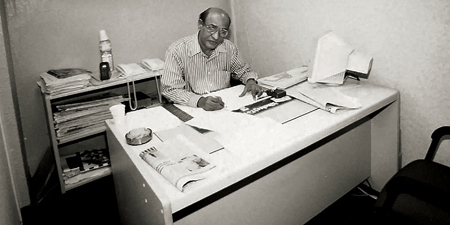Jamil Akhtar: We called him Daddy
JournalismPakistan.com | Published: 30 May 2019 | Stephen Manuel
Join our WhatsApp channel
Jamil Akhtar, former news editor of Dawn, died recently at 79. He was affectionately called Daddy by colleagues for his dedication and mentorship.Summary
He had many names. To his face, we referred to him as Jamil Sahib. On a more formal note, he was introduced to newcomers as the night editor. For those whose pages he pored over late into the night and meticulously corrected, he was the Blue Spider. But for most of us at the Khaleej Times, back in the late eighties, nineties and early 2000s, he was known as Daddy.
It was a name born out of affection and respect.
Jamil Akhtar, the former news editor of Dawn, passed away recently in Karachi at the age of 79. He was the last of a rare breed; hard-working, diligent, honest, fair and passionate about his work — a real journalist. When Jamil Sahib was present late into the night supervising the news content for the edition, there was always a sense of calm. He was there; it would be all right. Daddy would take care of it.
Six days out of seven, Jamil Sahib would not only organize, guide, and urge the news desk into bringing out the best edition possible but virtually ensure it. There would be no essential content missing; the layouts would be crisp and coherent, the story priorities would be impossible to argue with, the headlines would be well thought over and relevant and, most importantly, there would be no grammatical or spelling mistakes.
Every page that was done by a sub-editor, and there were days that the Khaleej Times would take out 48-page editions, Jamil Sahib would go over with a fine tooth comb, even after the proofreaders had done their job.
We would hand over an A-3 size print out to the proofreaders, carry out the corrections they found, and then take out another copy for Jamil Sahib. He would then carry out necessary editing changes, especially the local pages and the Pakistan Page, and then we would incorporate his changes into the copy.
Sometimes, he would almost wholly re-write the copy on the A-4, making changes to the intro, words, sentences, sometimes even re-jig the sequence of paragraphs, and of course, always, ensure that our commas, colons, and semi-colons were where they should be. Frequently, the page would have so much over-writing that it would be hard to follow all the changes. With ever-present deadlines, this could be very frustrating. The page would be blue with his scribbling and notes, and hence we gave him the nickname the Blue Spider.
That said, the end product would be difficult to fault. We might grumble, and we might groan, but we would also recognize that Jamil Sahib had our backs. He had us covered. There would be no mistake that would embarrass us the next day; there would be no error that required explanation. Daddy had taken care of it.
He was the daddy of the edition.
Jamil Sahib was the best teacher for any young journalist. He would painstakingly explain what contributed to a good story, a good headline, a good layout, a good page. Patiently, he would repeat those same lessons again and again. Only an idiot would not appreciate his sincerity or professionalism.
I, for one, will proudly say that I learned a lot from Jamil Sahib. Even today, I carry out many of the writing and editing exercises that he instilled. Indeed, this brings me to an incident which happened because of the lessons I learned from Jamil Sahib.
While the acting editor of a new daily from Islamabad, I found it necessary to do what Jamil Sahib had done … re-edit every page even after it had been through the proofreaders, the city editor, and the news editor.
Once I left a corrected page on the city editor’s desk after he had been through it. I must confess I had done a ‘blue spider’ on it. More than a few people got to see what I had done. The city editor was not happy, and neither was the sub-editor who had to carry out all the corrections. There was embarrassment and resentment all around.
At first, I could not understand what they were getting so uptight about. Had I not prevented them from making fools of themselves and showing their incompetence or lack of thoroughness?
It was a few hours later that it dawned on me. Had their reaction not been that of every new sub-editor that had crossed paths with Jamil Sahib?
It was an enlightening moment for me, one that made me appreciate Jamil Sahib more than ever. I realized it could never have been easy being in his shoes. His job was a thankless one, and yet he soldiered on.
For most, Jamil Sahib was the face of the newsroom, and their interaction with him remained mostly tethered to their work there. However, if one ever sat down with Jamil Sahib in his less busy hours, he would spew forth a wealth of information about matters that had nothing to do with the newspaper or journalism.
Jamil Sahib’s China stories were almost amazing as were those about his time in Dhaka. One learned a lot about the culture as well as nuances of different languages from him. He loved food and could talk endlessly about various delicious dishes, where they could be found and how they were made.
He could also, with great passion, recall, and knowledge, expound endlessly about cricket and in a newsroom, that was brimming with Indian journalists, there was no person happier than Jamil Sahib when Pakistan won. Jamil’s happy mood would be infectious and generous. A Pakistan win brought out the best in him.
I left the Khaleej Times before Jamil Sahib did and it was with surprise and pleasure that I discovered that he had gone back to Karachi and was now the news editor at Dawn.
I went to see him. He was the same as ever…busy at his desk. And that is how I will always remember him.
Rest in peace Jamil Sahib.
Photo courtesy: aurora.dawn.com
KEY POINTS:
- Jamil Akhtar served as the night editor at Khaleej Times for many years.
- He was known for his meticulous editing and dedication to quality journalism.
- Colleagues referred to him as Daddy, a term of endearment and respect.
- He nurtured young journalists through his guidance and teaching.
- Jamil Akhtar's storytelling and knowledge enriched the newsroom atmosphere.

























